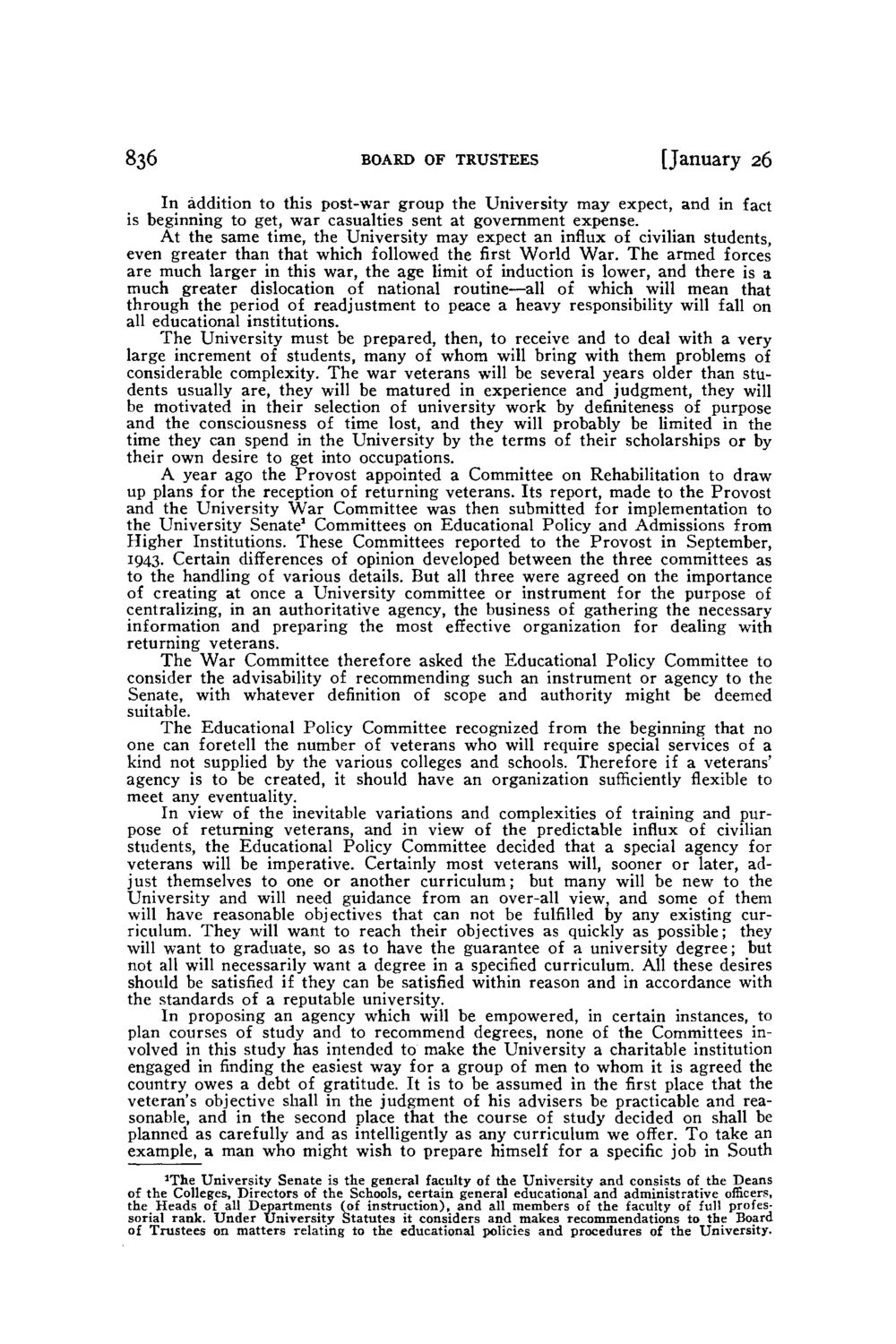| |
| |
Caption: Board of Trustees Minutes - 1944
This is a reduced-resolution page image for fast online browsing.

EXTRACTED TEXT FROM PAGE:
836 BOARD OF TRUSTEES [January 26 In addition to this post-war group the University may expect, and in fact is beginning to get, war casualties sent at government expense. At the same time, the University may expect an influx of civilian students, even greater than that which followed the first World W a r . T h e armed forces are much larger in this war, the age limit of induction is lower, and there is a much greater dislocation of national routine—all of which will mean that through the period of readjustment to peace a heavy responsibility will fall on all educational institutions. T h e University must be prepared, then, to receive and to deal with a very large increment of students, many of whom will bring with them problems of considerable complexity. T h e war veterans will be several years older than students usually are, they will be matured in experience and judgment, they will be motivated in their selection of university work by definiteness of purpose and the consciousness of time lost, and they will probably be limited in the time they can spend in the University by the terms of their scholarships or by their own desire to get into occupations. A year ago the Provost appointed a Committee on Rehabilitation to draw up plans for the reception of returning veterans. Its report, made to the Provost and the University W a r Committee was then submitted for implementation to the University Senate 1 Committees on Educational Policy and Admissions from Higher Institutions. These Committees reported to the Provost in September, 1943. Certain differences of opinion developed between the three committees as to the handling of various details. But all three were agreed on the importance of creating at once a University committee or instrument for the purpose of centralizing, in an authoritative agency, the business of gathering the necessary information and preparing the most effective organization for dealing with returning veterans. T h e W a r Committee therefore asked the Educational Policy Committee to consider the advisability of recommending such an instrument or agency to the Senate, with whatever definition of scope and authority might be deemed suitable. T h e Educational Policy Committee recognized from the beginning that no one can foretell the number of veterans who will require special services of a kind not supplied by the various colleges and schools. Therefore if a veterans' agency is to be created, it should have an organization sufficiently flexible to meet any eventuality. In view of the inevitable variations and complexities of training and purpose of returning veterans, and in view of the predictable influx of civilian students, the Educational Policy Committee decided that a special agency for veterans will be imperative. Certainly most veterans will, sooner or later, adjust themselves to one or another curriculum; but many will be new to the University and will need guidance from an over-all view, and some of them will have reasonable objectives that can not be fulfilled by any existing curriculum. They will want to reach their objectives as quickly as possible; they will want to graduate, so as to have the guarantee of a university degree; but not all will necessarily want a degree in a specified curriculum. All these desires should be satisfied if they can be satisfied within reason and in accordance with the standards of a reputable university. In proposing an agency which will be empowered, in certain instances, to plan courses of study and to recommend degrees, none of the Committees involved in this study has intended to make the University a charitable institution engaged in finding the easiest way for a group of men to whom it is agreed the country owes a debt of gratitude. It is to be assumed in the first place that the veteran's objective shall in the judgment of his advisers be practicable and reasonable, and in the second place that the course of study decided on shall be planned as carefully and as intelligently as any curriculum we offer. T o take an example, a man who might wish to prepare himself for a specific job in South J The University Senate is the general faculty of the University and consists of the Deans of the Colleges, Directors of the Schools, certain general educational and administrative officers, the Heads of all Departments (of instruction), and all members of the faculty of full professorial rank. Under University Statutes it considers and makes recommendations to the Board of Trustees on matters relating to the educational policies and procedures of the University.
| |